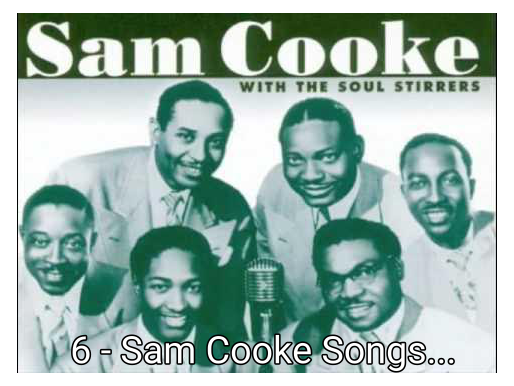(ThyBlackMan.com) Before Sam Cooke became a household name with hits like You Send Me and A Change Is Gonna Come, he was simply a young man with a velvet voice, raised on gospel, rooted in faith, and full of promise. This is the third time I’ve sat down to write about him, and every time, I find myself more in awe of his legacy. There’s just something about Sam Cooke’s voice—it doesn’t just sing to you, it knows you. It reaches into your soul with a kind of honesty that feels rare, even today.
While most fans celebrate his pop and soul catalog, I believe his gospel roots are where we truly meet the essence of who he was. His work with The Soul Stirrers—before the fame, before the crossover into mainstream music—holds a purity and emotional depth that’s simply unmatched. These gospel songs don’t just show us a singer; they reveal a young man wrestling with faith, hope, suffering, and salvation through music.
So in this piece, I want to highlight six of Sam Cooke’s gospel recordings that I believe everyone should hear—songs that still speak with power, tenderness, and truth in 2025. Whether you grew up on gospel music or are hearing these tracks for the first time, they offer a timeless connection to something sacred.

1. Touch the Hem of His Garment
Written by Sam Cooke himself at just 19 years old, “Touch the Hem of His Garment” remains one of the most iconic gospel songs of all time. Inspired by the biblical story of the woman healed by her faith in Matthew 9 and Luke 8, the song captures a moment of desperation met by divine power. This isn’t just gospel storytelling—it’s musical theology. Cooke’s voice rises and falls with emotional urgency, practically placing the listener at the hem of that garment themselves, reaching out in need of healing.
The structure of the song builds from soft reverence to spiritual fervor, capturing the arc of desperation giving way to deliverance. His voice—fluid and full of conviction—guides The Soul Stirrers in a slow-burning crescendo that feels both worshipful and deeply human. There’s a gospel blues undercurrent in his phrasing, a trace of the suffering and salvation themes that thread through both sacred and secular Black music traditions. What’s astonishing is how Sam’s voice becomes the narrator, the woman, and the testimony all at once—each note layered with empathy and belief.
Even more powerful is the way the song endures. It transcends denominations and generations. Whether played in a church service, on a dusty vinyl record, or streamed during moments of personal struggle, “Touch the Hem of His Garment” offers spiritual renewal like few other gospel tracks. For many gospel lovers, this track is more than just a classic—it’s a companion during sickness, a lullaby during uncertainty, and a praise song during healing. In 2025, it still has the power to move listeners to tears and faith alike.
2. Jesus Gave Me Water
“Jesus Gave Me Water” showcases Cooke at the crossroads of tradition and innovation. Recorded in 1951 during his early tenure with The Soul Stirrers, the song stands as a masterclass in storytelling and vocal finesse. It revisits the New Testament story of the Samaritan woman at the well—one of the few moments in the Bible where Jesus challenges societal norms with compassion. Cooke’s voice becomes the vessel of that compassion, retelling the story not just with accuracy, but with emotion and intimacy.
What makes this rendition especially compelling is the balance between reverence and rhythm. The arrangement is rooted in quartet tradition, but there’s a crispness and melodic movement in Cooke’s voice that nudges the genre forward. His voice dances above the harmonic base like rippling water—bright, refreshing, and smooth. The track is under two minutes long, but it’s packed with narrative power. The moment he sings, “And she left my Savior singing,” feels like the spiritual climax, hitting listeners with joy and the transformation of faith.
For the modern ear, “Jesus Gave Me Water” feels fresh rather than dated. It exemplifies how gospel laid the foundation for what would become soul music, particularly in the way Cooke blends melody with ministry. Even if you’ve never stepped foot in a church, the sheer emotional clarity of the song makes it universally accessible. It’s ideal for introducing younger audiences to the beauty of gospel while showing them the early DNA of R&B, soul, and even hip hop. In today’s fractured cultural landscape, this song still quenches a thirst for something real.
3. Peace in the Valley
Originally penned by the “Father of Gospel Music” Thomas A. Dorsey, “Peace in the Valley” has been covered by everyone from Elvis Presley to Mahalia Jackson. But Sam Cooke’s interpretation with The Soul Stirrers might be the most quietly powerful. His voice doesn’t overpower the lyrics—it cradles them. This is not just a performance; it’s a prayer. The yearning for peace in this song isn’t abstract—it’s visceral. The listener feels it in every breath, every syllable that Sam delivers with reverence and restraint.
Cooke’s rendition avoids vocal theatrics, focusing instead on sincere emotional delivery. The Soul Stirrers, with their understated harmonies, form a celestial backdrop—an ethereal soundscape that elevates the song from solemn ballad to sacred hymn. The beauty of this recording lies in its subtlety. Cooke isn’t begging for peace—he’s expecting it. That expectation, sung with unshakeable faith, makes the listener believe peace really is around the corner, despite the chaos of the world.
In today’s climate—of political unrest, personal anxiety, and global uncertainty—“Peace in the Valley” hits harder than ever. It’s perfect for Sunday mornings, quiet meditations, funeral services, or simply when the world becomes too much. Sam Cooke’s voice doesn’t just sing about peace—it becomes peace. It’s the type of song that calms racing thoughts, settles grieving hearts, and reminds us that even in our deepest valleys, the promise of spiritual tranquility is still alive.
4. Were You There?
This haunting spiritual, dating back to the 19th century, finds new life in Sam Cooke’s impassioned voice. “Were You There?” is more than a gospel hymn; it’s a spiritual lament that mourns the suffering of Christ while calling the listener into deep reflection. Originally sung by enslaved African Americans, the song is drenched in historical pain and theological gravity. Cooke’s version doesn’t attempt to modernize it—he reveres it, leaning fully into its emotional weight and honoring its historical roots.
Cooke uses silence and space to great effect here. His vocal is restrained, trembling even, as if burdened by the enormity of the crucifixion and the centuries of trauma this hymn represents. The Soul Stirrers provide a ghostly echo, making the piece feel like a spiritual séance where voices of the past join in sacred reverence. Every phrase—“Were you there when they crucified my Lord?”—lands like a question aimed not just at the listener, but at humanity itself. It’s not just a query about Christ—it’s an interrogation of our collective conscience.
What’s remarkable is how “Were You There?” still speaks volumes in today’s world. It forces a confrontation with injustice, sacrifice, and empathy. In a modern context, it can be heard as both a traditional lament and a broader call to remember the cost of redemption and the legacy of those who suffered for their faith—and for their freedom. For listeners looking for depth, truth, and transcendence, Sam Cooke’s rendition delivers a sonic experience that stretches across time, piercing the heart with every whisper and wail.
5. Come and Go to That Land
If there’s one gospel track that shows the joyous anticipation of the afterlife, it’s “Come and Go to That Land.” With a tempo that lifts the spirit and harmonies that feel like wings, this song celebrates the eternal home awaiting the faithful. Sam Cooke is beaming with hope and elation here. His voice, infused with energy and expectation, leads the Soul Stirrers in a rousing, almost ecstatic celebration of heaven and belonging.
Cooke doesn’t overpower the group; rather, he guides them like a joyful conductor in a spiritual call-and-response format. The lyrics “Where I’m bound, where I’m bound…” echo like a heartbeat of heaven’s promise. The harmonies are full and round, giving the piece a communal feeling—as if everyone who listens becomes a part of the choir. This is not just a performance; it’s an invitation to dance, clap, and join in holy anticipation.
What’s striking today is how contemporary this track still feels. It’s upbeat without being showy, spiritually rich without being heavy. Play it at a modern church service, a gospel brunch, or even during a daily devotional, and it still stirs the soul. It’s proof that gospel music isn’t only about bearing burdens—it’s also about joy, victory, and shared hope. Sam Cooke doesn’t just sing about the Promised Land—he transports us there, if only for a few minutes, showing us that the glory to come is just as powerful as the struggles we face.
6. He’ll Make a Way
“He’ll Make a Way” might not be as widely known as some of Sam Cooke’s other gospel recordings, but it is a hidden gem that deserves much more attention. The song is a powerful testament to the enduring message of divine provision during times of adversity—a theme that is just as relevant in 2025 as it was in the early 1950s. Cooke’s vocal delivery is calm, assuring, and grounded in a kind of spiritual maturity far beyond his years at the time.
The arrangement is minimal, intentionally so. It lets Cooke’s voice carry the message like a gentle breeze breaking through storm clouds. There’s no showboating or acrobatics—just a sincere, prayer-like performance that feels like a conversation between one man and his Creator. He sings with such understanding that listeners feel seen, heard, and held. That ability to create intimacy through sound is what makes this song a standout, despite being lesser known.
“He’ll Make a Way” can be listened to in a variety of settings—during personal prayer, at hospital bedsides, on sleepless nights, or during moments of fear and doubt. It doesn’t command attention like a choir-backed anthem. Instead, it draws you in quietly, with the kind of empathy only Sam Cooke could deliver. In a world that often feels chaotic and uncertain, this song functions like a balm—a reminder that no matter how lost we feel, a path will be made. Cooke doesn’t just sing the words—he delivers the comfort and assurance that lie behind them.
Revisiting these songs reminded me why Sam Cooke’s music still matters—not just because of his extraordinary voice, but because of how much heart he poured into every word. In these gospel recordings, you can hear his soul searching, testifying, and reaching for something greater than himself. And isn’t that what we all do in our quietest moments?
Even now, decades later, these songs have a way of finding you when you need them most. They offer comfort without preaching, truth without pressure. Whether you’re walking through grief, holding onto hope, or simply craving peace, Sam’s voice has a way of saying, “I’ve been there too.” That’s what makes his gospel music feel eternal.
This might be the third article I’ve written about him, but I’m certain it won’t be the last. Because Sam Cooke isn’t just a chapter in music history—he’s a voice that never stops speaking to the human spirit.
Staff Writer; Jamar Jackson

















Hello Jamar, I found your website by accident a few months ago and have enjoyed your music critiques. It was your Sam Cooke lists that got my attention. My name is Dave Bass (A gospel Singer/Songwriter in the tradition of Sam Cooke’s gospel music with The Soul Stirrers). My website is: http://www.davebassgospel.com.
I agree with LC, Sam’s brother. Sam never left gospel because he loved gospel. Although the economics in the gospel field lead him to switch to pop music, he did not turn his back on gospel. Gospel was in everything he sung because gospel was in him. He controlled it until the 1962 tour with Little Richard in England opened his eyes. He found out the audience responded favorably when he let his “gospel” feeling really come out. Also, after he became established and had control of his career, he started SAR Records with the idea to help gospel artist who still struggled in the gospel field. (He got the Soul Stirrers money for session work: Over At Mary’s Place). The first group he signed to the label was The Soul Stirrers. He supplied them with material to record. He wrote the first hit they had without him: Jesus Be A Fence Around Me.
Although he never recorded and released gospel with The Soul Stirrers after he left, Sam never left gospel. I believe he would have been a force helping to revive the gospel field and creating opportunities for gospel Artists.
(Even so, you will get a special treat if you get the ABKCO CD entitled: The Soul Stirrers-Singing In My Soul. Sam is singing background on two songs: Lead Me To Calvary and All Over This World)
Stay in touch.
Easy, Dave Bass
Sam Cooke’s gospel music truly speaks to the soul. His voice carries such raw emotion, and this article beautifully captures the depth of his faith and talent. “Touch the Hem of His Garment” and “Jesus Gave Me Water” are timeless classics that still resonate today. A wonderful tribute!
Wade In The Water is creative….
Nice selection! If you don’t mind me asking, how did you first come across Sam Cooke?
Now, add Be With Me Jesus, He’s Your Guide (God), and Come Let Us Go Back To God. Would’ve been nice if he and Johnnie Taylor stayed singing gospel with the Soul Stirrers.
I do agree with you.
Quick question: Do you feel he should have continued doing gospel songs even after leaving the group, or was it time for something new musically?